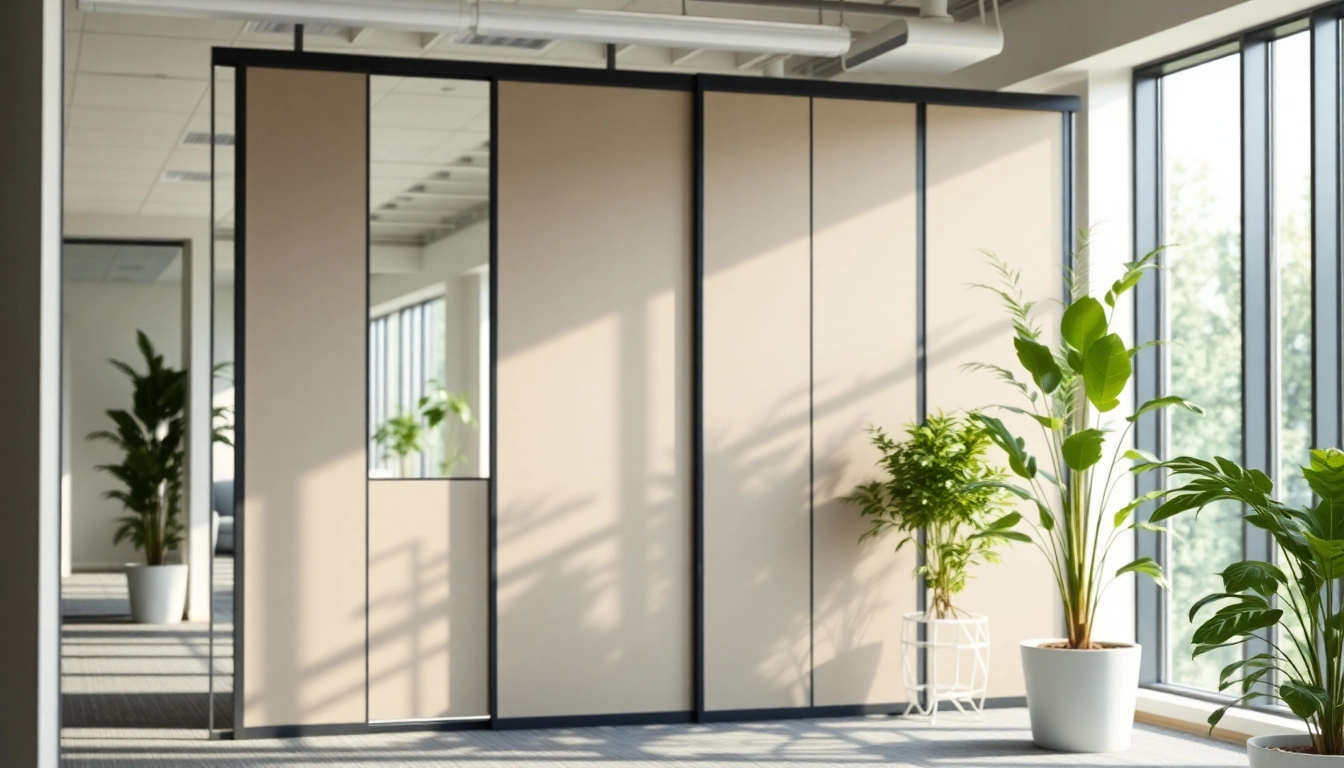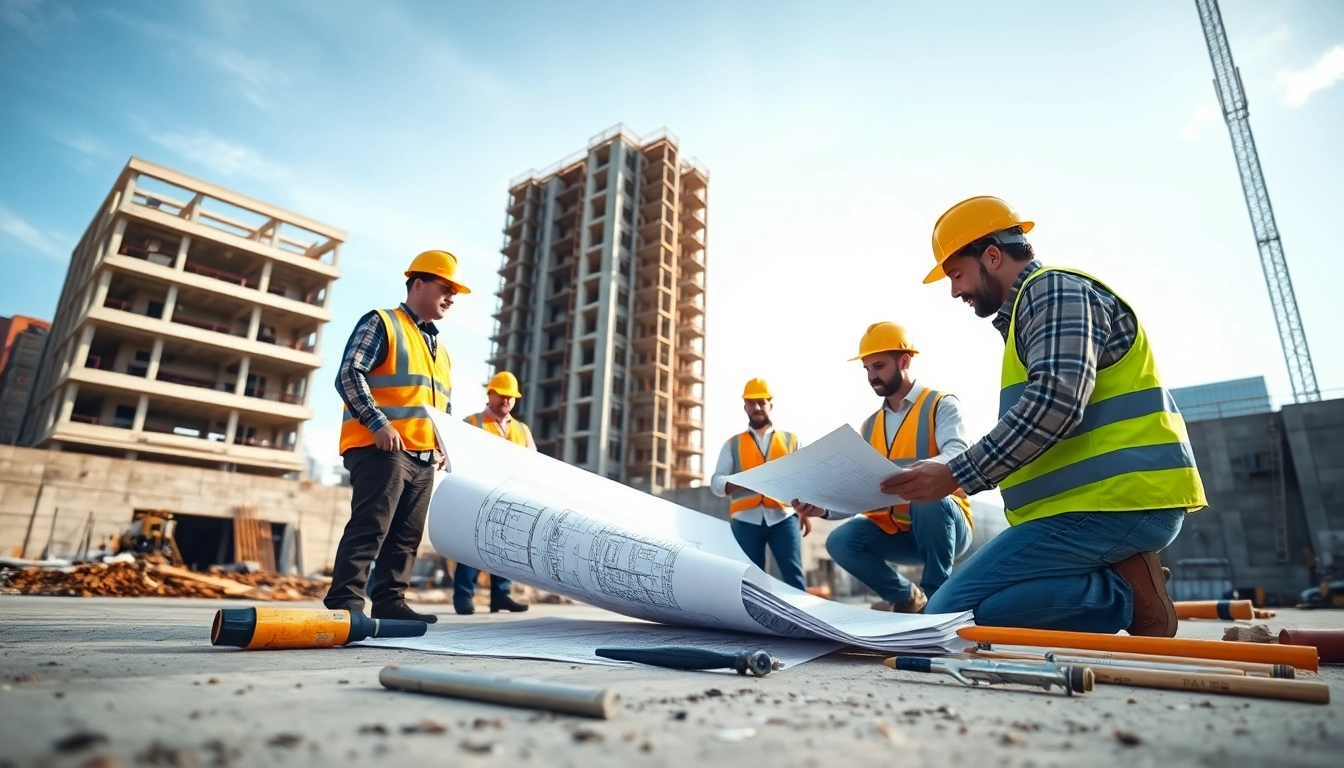Understanding Folding Partition Walls
Definition and Purpose of Folding Partition Walls
A Folding Partition Wall is a versatile interior construction solution designed to divide spaces within a building efficiently. These walls can be folded and unfolded to create temporary barriers that adapt to changing needs and situations. Their primary purpose is to optimize space usage by providing flexibility for various applications, such as conference rooms, classrooms, and event spaces.
Types of Folding Partition Walls Available
Folding partition walls come in many forms, catering to varying requirements across commercial and residential settings. The main types include:
- Accordion Partitions: An ideal choice for smaller spaces, accordion partitions fold back neatly against a wall, providing maximum flexibility without requiring significant clearance.
- Operable Walls: These are more sophisticated systems often equipped with soundproofing capabilities, perfect for conference rooms and auditoriums.
- Glass Partition Walls: Combining aesthetics with functionality, glass folding walls allow for natural light to flow while providing a sleek visual appeal.
- Acoustic Partitions: Designed to minimize sound transmission, these walls are essential for environments where privacy and concentration are paramount.
Who Benefits from Folding Partition Walls?
Various sectors can benefit from the implementation of folding partition walls:
- Educational Institutions: Schools and universities utilize folding partitions to create adaptable learning environments that can accommodate different class sizes and activities.
- Corporate Offices: As businesses evolve, the need for flexible workspaces becomes critical. Folding partitions help redefine office layouts without incurring substantial renovation costs.
- Event Venues: Banquet halls, convention centers, and exhibition spaces use these solutions to create diverse setups to cater to the needs of different events.
- Healthcare Facilities: In hospitals and clinics, folding walls can provide temporary spaces for consultations and meetings, ensuring privacy for patients.
Benefits of Folding Partition Walls
Space Optimization for Commercial Areas
Folding partition walls are a vital addition to commercial spaces, allowing businesses to maximize their square footage. These walls make it possible to transform open areas into smaller, functional rooms. In retail environments, for instance, folding partitions can create distinct areas for different merchandise or promotional events without the need for extensive construction work. This adaptability ensures that businesses can respond dynamically to seasonal sales or special events.
Sound Control and Acoustical Properties
One of the most significant advantages of folding partition walls is their ability to provide excellent sound insulation. Acoustic partitions are engineered using specialized materials that absorb sound, making them a perfect choice for areas that require privacy, such as meeting rooms and conference spaces. By incorporating soundproofing technology, organizations can ensure confidentiality and minimize distractions, improving overall productivity and collaboration within the workplace.
Cost-Effectiveness and Flexibility
The cost-effectiveness of folding partition walls cannot be overstated. Compared to permanent wall structures, folding partitions offer a budget-friendly alternative for creating modular spaces without extensive renovations. Their flexibility allows for quick adjustments in layout, ensuring that businesses can adapt to new demands without incurring additional costs. Additionally, their installation does not involve extensive downtime, allowing organizations to continue operations with minimal disruption.
Choosing the Right Folding Partition Wall
Key Features to Look For
When selecting a folding partition wall, consider the following features to ensure it meets your needs:
- Acoustic Performance: If sound control is critical to your needs, look for partitions designed with high STC (Sound Transmission Class) ratings.
- Material Quality: Choose durable materials that can withstand wear and tear over time, especially in high-traffic areas.
- Ease of Operation: Look for partitions that can be easily opened and closed by a single person, promoting convenience and efficiency.
- Design and Aesthetics: Ensure the partition design aligns with your overall space aesthetics, available in various colors and finishes to match your decor.
Material Options and Durability
The material of folding partitions greatly impacts their usability and longevity. Common materials include:
- Plywood: A lightweight, economical option that can be laminated with various finishes.
- Steel: Provides enhanced durability, making it suitable for high-traffic commercial environments.
- Glass: Offers a modern, sleek appearance but requires special consideration for maintenance and fragility.
- Vinyl and Composite Materials: Often used for their affordability and range of design options while providing decent insulation properties.
Customization and Design Considerations
Customization options play a crucial role in ensuring that your folding partition walls meet specific requirements. Consider the following:
- Height and Width: Custom dimensions can ensure the partitions fit seamlessly into your designated space.
- Finishes: Options like paint, laminate, or wallpaper can be applied to make partitions more visually appealing.
- Features: Consider additional features like windows or pass-throughs to enhance functionality.
Installation and Maintenance of Folding Partition Walls
Simple Installation Process
The installation process for folding partition walls is generally straightforward compared to traditional wall construction. Professional installers can typically complete the setup in a matter of hours, depending on complexity. Basic steps include:
- Initial measurement and planning to determine desired locations and configurations.
- Framework erection if required, typically involving tracks for sliding models.
- Mounting the partition panels and ensuring smooth operation during folding and unfolding.
- Final adjustments for alignment and ensuring acoustic integrity are achieved.
Regular Maintenance Tips for Longevity
To ensure your folding partition wall remains functional and aesthetically pleasing over time, consider these maintenance tips:
- Routine Cleaning: Regularly dust and clean surfaces to prevent buildup. For glass partitions, use a glass cleaner appropriate for the material.
- Check Moving Parts: Inspect hinges, tracks, and other moving components for wear, ensuring they operate smoothly.
- Address Damage Promptly: Any dents, scratches, or damages should be repaired immediately to prevent further deterioration.
Common Issues and Troubleshooting
Even with regular maintenance, issues can arise with folding partitions. Common problems include:
- Sticking Panels: This can often be resolved by cleaning the tracks or lubricating moving parts.
- Aesthetic Damage: For minor scratches or dents, touch-up paint or refinishing can restore appearance without full replacement.
- Improper Sealing for Sound Insulation: Check if adjustments are needed for panel alignment, ensuring a tight seal when closed.
Future Trends in Folding Partition Walls
Innovations in Design and Technology
As technology keeps evolving, so do the designs and functionalities of folding partition walls. Trends to watch for include:
- Smart Partition Systems: Integration of technology, such as built-in sound systems or electronic controls that automate the opening and closing processes.
- Modular Design: Increasing demand for modular designs that provide ultimate flexibility and ease in changing layouts frequently.
Eco-Friendly Materials and Solutions
In response to growing environmental concerns, many manufacturers are now offering eco-friendly materials for folding partitions. Options may include:
- Sustainably Sourced Woods: Utilizing responsibly harvested timber for constructing robust partitions.
- Recycled Materials: More products are being made from recycled plastic or metal, reducing waste and promoting sustainability.
Integrating Folding Partitions in Smart Spaces
With the rise of smart building technology, folding partitions can be integrated into larger smart systems. This integration enables intuitive space management through IoT-based controls, allowing users to adapt their environments easily according to situational needs, promoting productivity and comfort.


